On Monday, Sept. 20, the Edmonton Oilers announced that Kevin Lowe’s No. 4 will be raised to the rafters of Rogers Place before their game against the New York Rangers on Nov. 5. The Hall-of-Fame defenceman becomes the eighth player to have his number retired by the franchise, following his former teammates, Al Hamilton (No. 3), Paul Coffey (7), Glenn Anderson (9), Mark Messier (11), Jari Kurri (17), Grant Fuhr (31), and, of course, Wayne Gretzky (99).
Lowe has long been considered the last name missing from this exclusive club, and his jersey retirement will bring a sense of completion to the collection of banners hanging in Rogers Place. It could be another 15 to 20 years before another number is retired by the organization. That all depends on Connor McDavid’s career plans.
But there are still a host of former Oilers who deserve to be honoured, which is what makes the “Recognition of Edmonton Oilers Greats” initiative so exciting. While still in the early planning stages, it’s described as a new area for fans to celebrate Oilers of distinction.
This initiative is presumably in the same spirit as the Vancouver Canucks’ “Ring of Honour”, which includes those who have not had their number retired by the organization but still deserve a lasting distinction. Many teams across sports have similar programs to celebrate a secondary group of franchise greats who maybe aren’t quite at the level of having their numbers retired.
It’s tough to know where to begin with a franchise as rich in tradition as the Oilers. Despite the eight players who have had their numbers retired, that still leaves several who rank among the all-time franchise leaders, most of the team’s former captains, some multi-Stanley Cup champions and many All-Stars.
After much careful consideration, here are five former players who should be the first to enter the area celebrating Oilers of distinction. With apologies to those who just missed the cut, this quintet stands above the pack:
Charlie Huddy (Defenceman, 1980-1991)
An undrafted defenceman who signed with Edmonton in 1980, Huddy was a fixture on the Oilers’ blue line for more than a decade. He is one of seven players to be part of all five of Edmonton’s Stanley Cup-winning teams (1984, 1985, 1987, 1988, 1990).
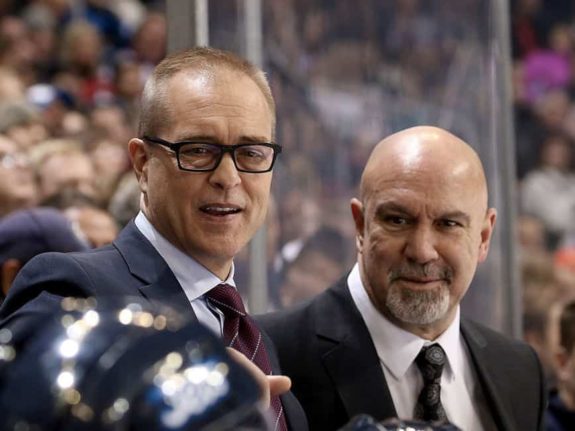
Huddy is second to Lowe in career games played among defensemen for the Oilers in the regular season (694) and playoffs (138). His 81 goals are more than any franchise defenceman not named Coffey, and he is one of just three blueliners in franchise history with a 20-goal season (1982-83). He ranks 13th all-time with 287 assists for Edmonton.
In 1982-83, Huddy received the inaugural Emery Edge Award after leading the NHL with a plus/minus of plus-62, his first of three consecutive seasons registering a rating of 50 or higher. He was given the Oilers’ Defenceman of the Year Award for 1982-83 and 1988-89 and won the team’s Unsung Hero award back-to-back in 1988 and 1989.
Huddy was selected by the Minnesota North Stars during the Dispersal and Expansion Draft of 1991 and was traded to the Los Angeles Kings during the 1991 Entry Draft. He retired in 1997 but later returned to become an assistant coach for the Oilers from 2000 to 2009.
Bill Ranford (Goalie, 1988 – 1996, 1999-2000)
The all-time franchise leader in regular-season games played by a goalie (449), Ranford was acquired from the Boston Bruins on March 8, 1988, and in 1989-90, took over the starting goalie position from Fuhr, a role he held for nearly seven seasons.
Ranford backstopped the Oilers to the Stanley Cup in 1990. He won the Conn Smythe Trophy as playoff MVP after earning a 16-6 record with a 2.53 goals-against average and .912 save percentage.
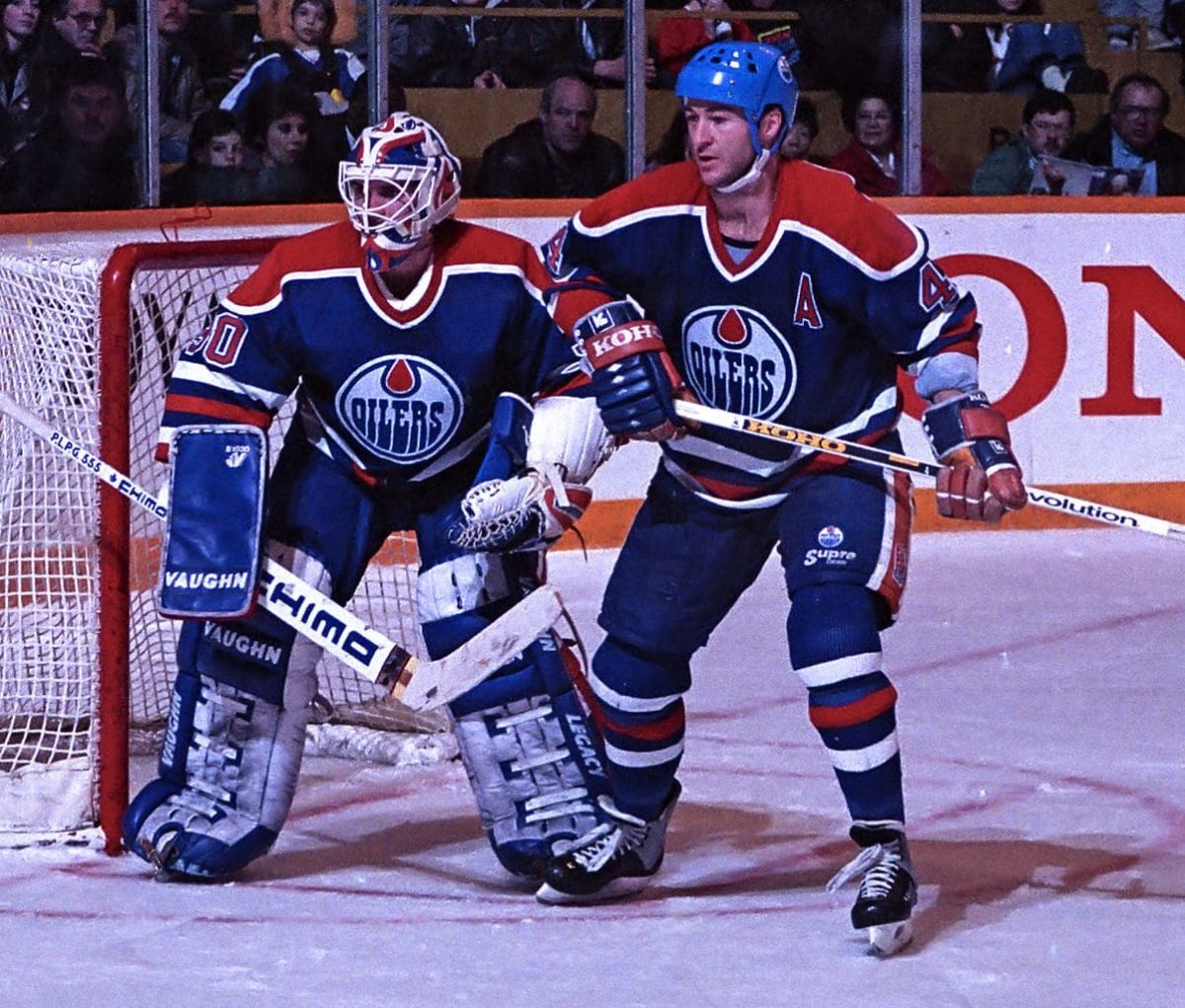
While the rest of Edmonton’s roster was like a revolving door during its 1990’s rebuild, Ranford was the backbone of the franchise. He was traded back to Boston on Jan. 11, 1996, but returned to finish his career with the Oilers, taking on a backup role for the 1999-2000 season before he retired.
Ranford was Edmonton’s Molson Cup winner four times (1990-91, 1992-93, 1993-94, 1994-95) and received the Zane Feldman Trophy as team MVP four seasons in a row, from 1990-91 to 1993-94). He represented the Oilers at the 1991 NHL All-Star Game in Chicago.
Ranford is the franchise leader in saves (11,502) and the only Oilers goalie with 2,000 saves in a single season, turning aside 2,089 shots in 1993-94, ranked 12th in NHL history. He ranks second all-time in franchise history in wins in both the regular season (167) and playoffs (25), behind Fuhr in both categories.
Ryan Smyth (Left Wing, 1995-2007, 2011-2014)
If there is any player who deserves to have his jersey retired by the Oilers, most would agree it’s No. 94, Ryan Smyth. All heart and soul, the universally loved forward bled orange and blue. Throughout 15 seasons and more than 1,000 games (regular season and playoffs combined), he became the face of the franchise for a generation of Oilers fans.
A native of Banff, Alberta, Smyth was drafted sixth overall by the Oilers in 1994 and made his NHL debut several months later. The trade that sent him to the New York Islanders on Feb. 27, 2007, broke the city’s heart almost as much as when Gretzky was dealt to the Kings in 1988, but Smyth returned as a free agent in 2011 and played the final three seasons of his career in Edmonton.
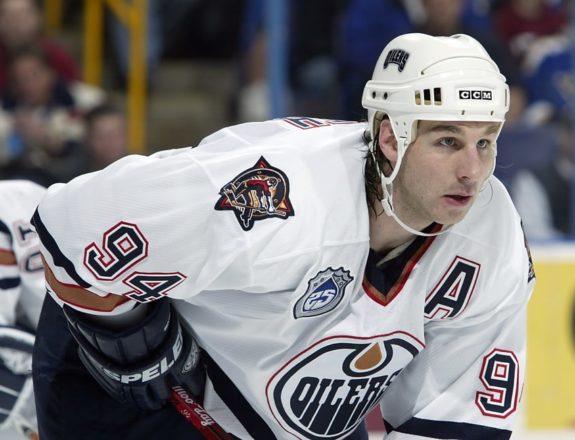
Smyth is all over the Oilers’ all-time regular-season leaders lists, ranking second in games played (971), fifth in goals (296), eighth in assists (335), sixth in points (631), and is tied with Anderson for first place with 126 power-play goals. He had eight seasons of 20 or more goals with the Oilers, ranked fifth in team history. He also ranks eighth for Oilers playoff goals with 22, seven of which came during Edmonton’s run to the Stanley Cup Final in 2006.
He earned the nickname “Captain Canada” for the many times he represented his country. During his Oilers tenure, he captured five gold medals in international competition: 1995 World Juniors, 2002 Olympics, 2003 and 2004 World Championship, and 2004 World Cup.
Esa Tikkanen (Left Wing, 1985 – 1993)
An elite shutdown forward and clutch scorer with a truly unique personality, Tikkanen was selected 80th overall by Edmonton in the 1983 NHL Draft. He made his NHL debut during the team’s 4-1 victory over the Philadelphia Flyers in the 1985 championship series; the first of four occasions (1985, 1987, 1988, 1990) he would capture the Stanley Cup with the Oilers.
Tikkanen ranks 11th in goals (178), fifth in shorthanded goals (21) and eighth in game-winning goals (30) in franchise history. He scored 51 goals in the postseason, making him one of five players to pass 50 goals in franchise playoff history.
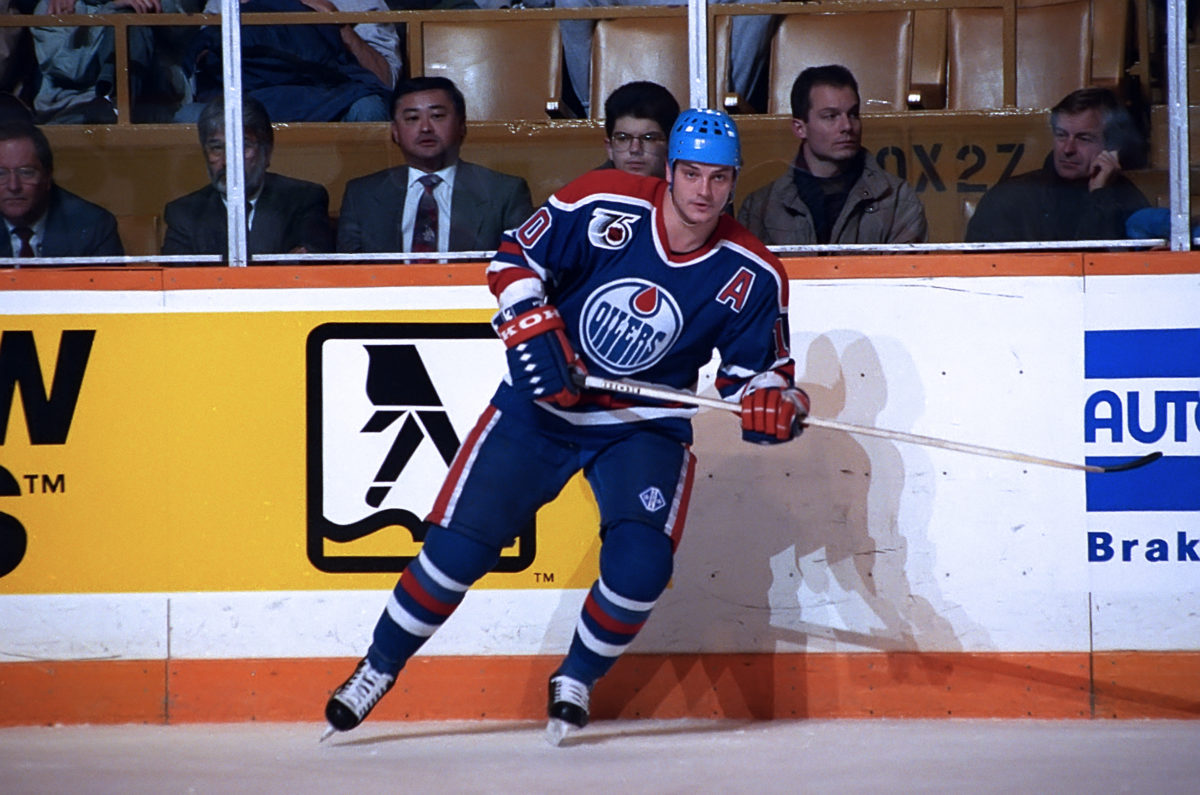
With Gretzky and Kurri, the Helsinki, Finland, product was part of the “Finnish Sandwich”, considered among the great forward lines in NHL history. After Gretzky was traded, Tikkanen became famous for shadowing The Great One when he was a member of the LA Kings and was instrumental in knocking the Kings out of the postseason in three straight years from 1990 to 1992.
As an Oiler, Tikkanen scored 10-plus goals and totalled 20-plus points in a single postseason three times (1988, 1990, 1991). He cemented his playoff legacy in Game 7 of the 1991 Smythe Division Semi-final against the Calgary Flames when he potted two goals and had an assist as Edmonton rallied from a 3-0 first-period deficit. He then scored his hat-trick goal in overtime to end the series.
On March 17, 1993, Tikkanen was traded to the New York Rangers for Doug Weight. He won his fifth Stanley Cup with the Rangers in 1994.
Doug Weight (Center, 1993 – 2001)
Weight joined the Oilers as they were beginning their post-Dynasty rebuild and became an irreproachable leader over eight-plus years with the club.
Between 1993-94 and 2000-01, the superb playmaker led Edmonton in points and assists seven times and scored 20-plus goals six times. Weight’s 25 goals and 79 assists in 1995-96 make him the only Oiler with a 100-point season between 1989-90 (Mark Messier) and 2016-17 (Connor McDavid). He represented the Oilers at three All-Star Games (1996, 1998, 2001) and received the Zane Feldman Trophy twice (1995-96, 1997-98).
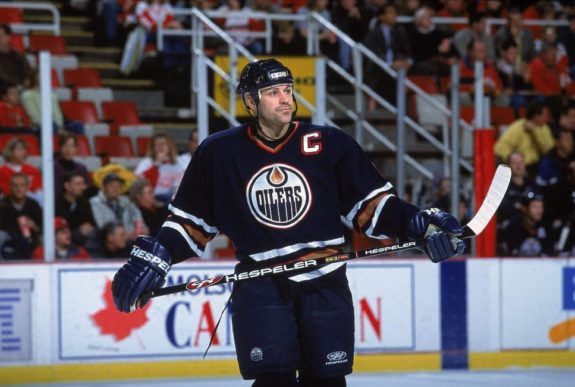
The Oilers ended a four-year postseason drought in 1997 and made the playoffs in each of Weight’s final five seasons with the club, twice advancing to the second round (1997, 1998). He had 33 points in 39 playoff games, including 23 assists, the most among Oilers who did not play in the ‘80s.
After four seasons as an alternate captain, Weight was named the 10th captain in franchise history in 1999, succeeding Kelly Buchberger. He wore the ‘C’ until he was traded with Michael Riesen to the St. Louis Blues on July 1, 2001, for forwards Jochen Hecht and Marty Reasoner and prospect Jan Horacek. Weight ranks sixth in assists (420), seventh in points (577) and second in power-play assists (207) in franchise history.
These five names just scratch the surface of Oilers greats who warrant consideration for this new honour. It is not clear how many players will be included at the outset, but there could easily be five more, and another five after that, and so forth. The Oilers said more details will be announced later this season. That leaves us plenty of time for debate. Let the fun begin.